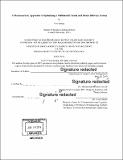| dc.contributor.advisor | Mohammad Moshref-Javadi. | en_US |
| dc.contributor.author | Kuang, Yue(Yue Rick) | en_US |
| dc.contributor.other | Massachusetts Institute of Technology. Supply Chain Management Program. | en_US |
| dc.date.accessioned | 2019-10-04T21:32:28Z | |
| dc.date.available | 2019-10-04T21:32:28Z | |
| dc.date.copyright | 2019 | en_US |
| dc.date.issued | 2019 | en_US |
| dc.identifier.uri | https://hdl.handle.net/1721.1/122401 | |
| dc.description | Thesis: M. Eng. in Supply Chain Management, Massachusetts Institute of Technology, Supply Chain Management Program, 2019 | en_US |
| dc.description | Cataloged from PDF version of thesis. | en_US |
| dc.description | Includes bibliographical references (pages 50-51). | en_US |
| dc.description.abstract | The success of e-commerce continues to push the bounds of delivery services as customers expect near instant fulfillment at little additional cost. This demand for delivery performance and operational cost efficiency has led to the exploration of the last-mile delivery problem using creative multimodal delivery systems. One promising system consists of a truck that can carry and deploy multiple autonomous drones to assist in the fulfillment of customer demand. The contribution of this thesis is towards furthering the understanding of the application of autonomous flying drones in such a system and improve parcel delivery performance within the constraint of the current state of technology. This thesis explores the feasibility of deploying drones in last-mile delivery by modeling and then optimizing the cost of serving customers with a system consisting of one truck and multiple drones under multiple customer demand scenarios. While this optimization problem can be solved with mixed integer linear programming (MILP), the computation requirement is such that MILP is inefficient for real world scenarios with 100 or more customers. This research applies metaheuristic methodology to solve the truck-and-drone problem for scenarios with up to 158 customers in approximately 30 minutes of computation time. The test results confirm an average of 7% to 9% in savings opportunity for a 2-drone baseline over traditional single truck delivery tours. This savings opportunity is shown to vary with customer density, number of drones carried, range of drone flight, and speed of drone relative to speed of truck. | en_US |
| dc.description.statementofresponsibility | by Yue Kuang. | en_US |
| dc.format.extent | 51 pages | en_US |
| dc.language.iso | eng | en_US |
| dc.publisher | Massachusetts Institute of Technology | en_US |
| dc.rights | MIT theses may be protected by copyright. Please reuse MIT thesis content according to the MIT Libraries Permissions Policy, which is available through the URL provided. | en_US |
| dc.rights.uri | http://dspace.mit.edu/handle/1721.1/7582 | en_US |
| dc.subject | Supply Chain Management Program. | en_US |
| dc.title | A metaheuristic approach to optimizing a multimodal truck and drone delivery system | en_US |
| dc.type | Thesis | en_US |
| dc.description.degree | M. Eng. in Supply Chain Management | en_US |
| dc.contributor.department | Massachusetts Institute of Technology. Supply Chain Management Program | en_US |
| dc.identifier.oclc | 1119722444 | en_US |
| dc.description.collection | M.Eng.inSupplyChainManagement Massachusetts Institute of Technology, Supply Chain Management Program | en_US |
| dspace.imported | 2019-10-04T21:32:28Z | en_US |
| mit.thesis.degree | Master | en_US |
| mit.thesis.department | SCM | en_US |

